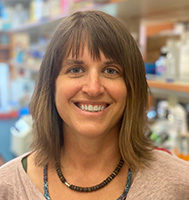Our team is pursuing basic, preclinical and clinical mechanisms to induce in vivo activated innate immune effector cells to provide anti-tumor benefit. See a history of our work in 45 Years of Cancer Immunotherapy Research: A Journey of Persistence, Luck, Mentors, Colleagues and Students.
One component of this work is focused on NK cells and uses the strategy of Antibody Dependent Cellular Cytotoxicity (ADCC), whereby tumor reactive monoclonal antibodies can home in vivo to sites of tumor, and facilitate in vivo tumor destruction by IL2 activated NK cells. In murine experimentally induced syngeneic tumor models we are evaluating the efficacy and mechanisms that enable immune interventions to induce in vivo tumor destruction. This work involves treatment with tumor reactive monoclonal antibodies and their genetically engineered derivatives. Preclinical data suggest efficacy will be best demonstrated in the setting of minimal residual disease. In a recent Children’s Oncology Group Phase III trial, we demonstrated the benefit of this approach in augmenting disease-free survival for children with high-risk neuroblastoma. We have also been investigating fusion proteins created by fusing humanized antitumor mAbs to human IL2. Our preclinical data show this approach is more potent than combinations of mAb + IL2, and demonstrate a prominent role for NK cells. We have completed single institution Phase I and II trials of the hu14.18-IL2 molecule in adults with relapsed melanoma at the University of Wisconsin Comprehensive Cancer Center (UWCCC), and Phase I and II trials in children with relapsed/refractory neuroblastoma, through the Children’s Oncology Group. The Phase II study has documented activity of this approach, particularly for children with smaller amounts of relapsed disease. Potent in vivo immunological activation has been observed, including clear demonstration that the circulating hu14.18-IL2 molecule has activated NK cells in vivo, and can enable them to mediate tumor reactive ADCC. In vitro analyses of immune activation, and analyses of genetic polymorphisms related to immune-mechanisms in these treated patients are helping to identify the in vivo pathways of anti-tumor effects. In vitro and murine model studies are being used to determine how these and related molecules might be used more effectively to provide augmented immune-mediated antitumor benefit
A separate but related initiative is pursuing novel preclinical applications in tumor-bearing mice of 2 separate agents already in clinical trials. CD40 ligation (with agonist anti-CD40 monoclonal antibody), and Toll-like receptor-9 activation (using CpG) are being tested clinically, largely as adjuvant approaches to enhance vaccine strategies. In our preclinical studies we have shown that they are also able to activate effector macrophages to mediate in vivo antitumor responses, even in the absence of T, B or NK cells. When combined, anti-CD40 antibody and CpG are synergistic in inducing tumor growth inhibition, in a sequence dependent fashion. Preliminary data suggest that this is occurring in tumor bearing animals by converting immunosuppressive (M2) macrophages into effector (M1) macrophages. Furthermore, preliminary data are indicating that the antitumor effects of anti-CD40 + CpG can be enhanced substantially via ADCC, by co-administering a tumor reactive monoclonal antibody.
Additional Research Activities
- Clinical Cancer Immunotherapy
- Cancer Immunology Research
- BMT Research
- NK and Monoclonal Anti-body Research
- Pediatric Oncology Research
- Member of Training Program and Training Grants:
- Medical Microbiology and Immunology
- Cell and Molecular Biology
- Cellular and Molecular Pathology
- Genetics
Research News

Paul Sondel and team awarded Band of Parents grant
Principal investigator Paul Sondel, MD, PhD, professor and research director, Division of Hematology, Oncology, and Bone Marrow Transplant, and co-investigator Amy Erbe-Gurel, PhD, research assistant professor, received a two-year, $125,000 award from Band of Parents for their …
January 14, 2025
Paul Sondel and Amy Erbe-Gurel receive two-year grant to study bispecific antibody treatment for neuroblastoma
The Hyundai Hope on Wheels foundation has awarded a Hyundai Hope Scholar Award to Paul Sondel, MD, PhD, professor and research director in the Division of Hematology, Oncology, and Bone Marrow Transplant, and Amy Erbe-Gurel, …
July 22, 2024
Hartwell Foundation grant will support Amy Erbe-Gurel’s research on immunotherapy and high-risk neuroblastoma
Amy Erbe-Gurel, PhD, assistant professor, Division of Hematology, Oncology, and Bone Marrow Transplant, was awarded a Hartwell Individual Biomedical Research Award from the Hartwell Foundation. Erbe-Gurel’s project, “Inhibitors to Epigenetic Modifiers Improve the Efficacy of …
July 1, 2024
Six students and their mentors receive undergraduate research fellowships
On May 3, Chancellor Jennifer Mnookin hosted the Chancellor’s Undergraduate Awards Ceremony for the 2023-2024 academic year. This year, six students mentored by Department of Pediatrics faculty members were highlighted at the event. Hilldale Undergraduate/Faculty …
June 13, 2024
Paul Sondel and Amy Erbe-Gurel receive U01 subaward to study neuroblastoma vaccines
Paul Sondel, MD, PhD, professor, Division of Hematology, Oncology, and Bone Marrow Transplant, and Amy Erbe-Gurel, PhD, senior scientist III in the Sondel Lab, are recent subaward recipients of a National Institutes of Health (NIH) U01 grant. Sondel and …
August 18, 2023- More News...
